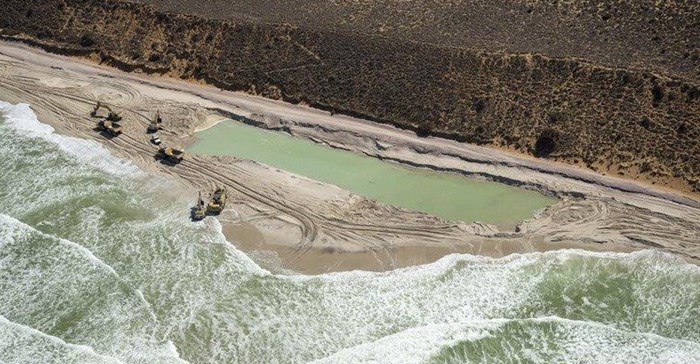Environment Minister Barbara Creecy's decision to allow vastly expanded West Coast beach mining has prompted sharp criticism from environmentalists.

Environment minister Barbara Creecy’s decision to allow mining on ten more West Coast beaches has prompted criticism from environmentalists. Photo: John Yeld
Appointed at the end of May last year, Creecy was seen as a new broom, particularly after making a number of decisions that delighted environmentalists and conservationists, such as rejecting plans for a giant new open-pit coal mine outside Springs and temporarily banning the octopus fishery in False Bay following whale entanglements.
But recent controversial decisions by the new minister – particularly to allow weakened sulphur dioxide air pollution standards (so-called minimum emission standards) and to approve greatly expanded West Coast mining – have soured the relationship.
Controversy
Cape Town-based activist lawyer group, the Centre for Environmental Rights (CER), said it was “disappointed” by her decision to grant environmental authorisation for an extension of a mining right to Australian company MRC (Mineral Commodities Ltd, through its South African subsidiary Mineral Sands Resources) that had a history of non-compliance with environmental laws at its Tormin mine on the West Coast. The company had also been at the centre of “immense controversy and conflict” in its bid to mine at Xolobeni in the Eastern Cape.
The CER was one of three appellants whose arguments against the expanded mining were rejected by Creecy.
The appeal process had revealed “significant prejudice” and it was considering bringing a High Court review challenge of Creecy’s decision, the CER said.
While the CER was “very concerned” about mining on 10 unspoilt beaches in a critical biodiversity area of the West Coast, it was even more concerned that Creecy had decided to allow this mining without more rigorously testing the findings of the mining company-appointed environmental consultants, it said. The impact of the proposed mining expansion and other assessments had all been conducted by Tormin-appointed consultants, the CER said.
“In order for a civil society organisation, an individual or other appellant to effectively challenge the findings of the company-appointed consultant, it must disprove the findings of that consultant. This is an immense and unfair burden on appellants – and one that could cost hundreds of thousands of rands.”
“Appellants should be able to raise concerns about a critical biodiversity area and list the potential negative impacts, and the environment minister should take these seriously and have them further investigated, instead of dismissing an appeal on the basis of untested submissions by a company-appointed consultant.”
Another appellant, Professor Merle Sowman, who is head of UCT’s Department of Environmental and Geographical Science, also expressed concern at the decision.
She said she found it “most surprising” that while Creecy and her Department of Forestry, Fisheries and the Environment (DEFF) were tasked with safeguarding the environment, in this case they appeared to have overlooked some fundamental environmental concerns.
“And from the way that they’ve rebutted my comments about the need for a proper assessment of the cumulative impacts of mining in this West Coast area, they have clearly not understood what I was saying.
“There are so many applications currently underway for prospecting and mining in this coastal area, including on farms adjacent to the Olifants River estuary, but DEFF is assessing each application separately rather than looking at the impacts and implications of mining along this entire area.”
“Cumulative impacts don’t only refer to impacts on marine and terrestrial biodiversity – they also relate to issues like the use of water, for example. The West Coast is a water-scarce area and the increasing use of water for mining will have a negative impact on the availability of water for a number of communities here.
Weak response
“Then there is the issue of increased traffic from the expansion of mining, like the impacts on roads and on health, all sorts of issues. So I think this is a very narrow response from the department and they clearly haven’t understood the real meaning of cumulative impacts.
There had also been a “really weak” response from DEFF to her objection to Tormin’s expansion because no full strategic environmental assessment (SEA) had been done for this coastal area, Sowman said.
“The question here is, from a strategic point of view, is mining the optimal use of this area and its resources? And what are the potential losses? It’s only when you do a strategic assessment that the full impacts of issues like water use and overall biodiversity loss reveal themselves. DEFF’s response was simply: it is not the responsibility of the applicant to do this.”
Creecy has been challenged to visit the West Coast area with the appellants so that she can get a first-hand understanding of their many environmental concerns in the region.
The challenge comes from veteran West Coast environmental activist and conservationist Suzanne du Plessis. A member of the Olifants River Estuary Advisory Committee which has been lobbying for proper protection of the area for close to two decades, Du Plessis said she was “very disappointed” with Creecy’s mining decision.
“I held her in such high regard. I think it’s time we asked her to come and do a site visit and then give us her commentary – not just sit at her desk and sign something off,” she said.
* Minister Creecy and DEFF were invited to respond to a series of questions based on this article. The department acknowledged the questions and said a comprehensive response was planned.





























































